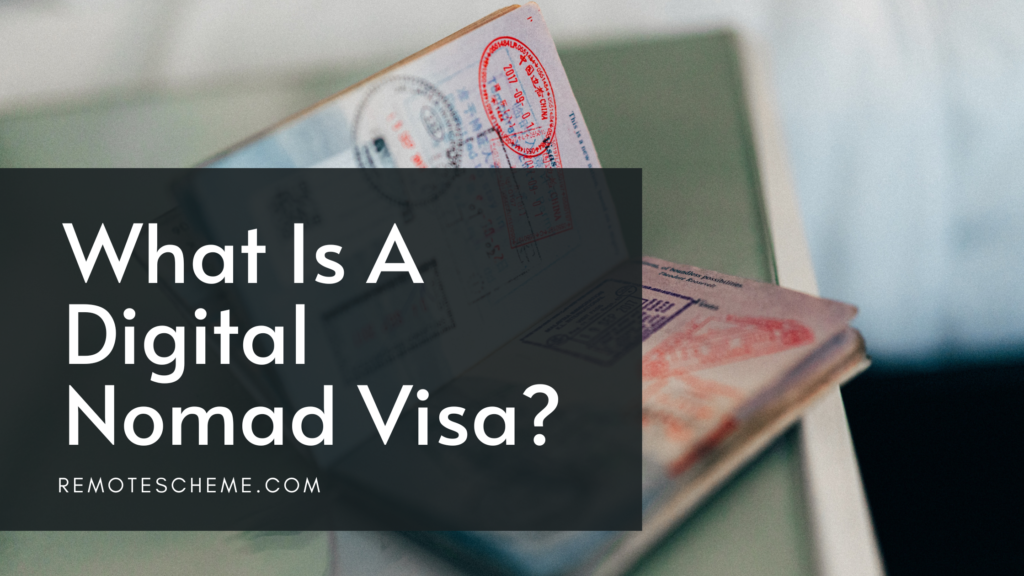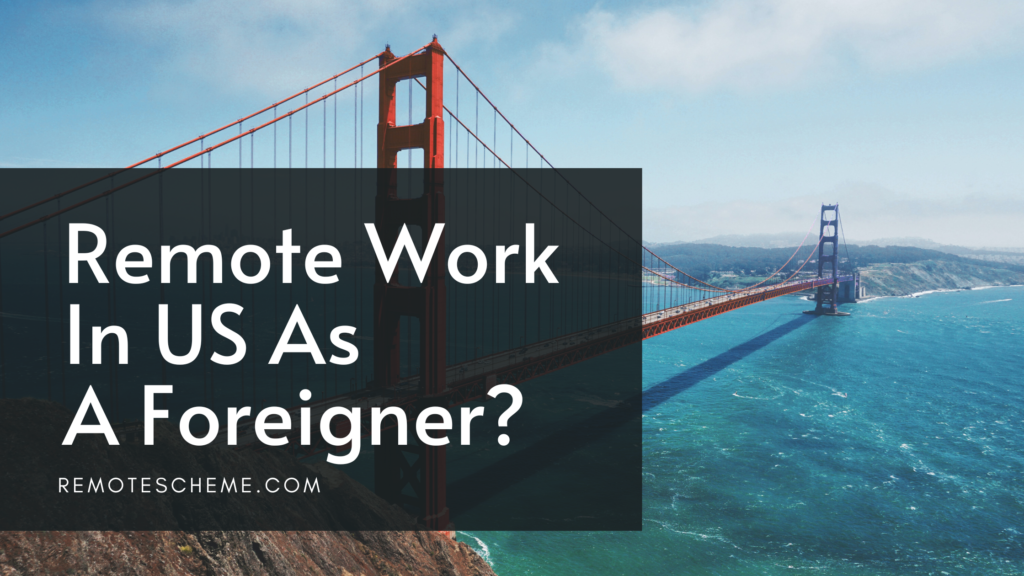To stimulate the economy and boost local tourism, more and more countries are offering a new type of visa for digital nomads who travel the world.
These visas are for adventurous employees, self-employed entrepreneurs, and remote staff who want to work while exploring a foreign country for 1-2 years.
So, what is a digital nomad visa, exactly? How does it differ from any other type of visa? Stick around to learn all about the definition, application requirements, and best countries for a digital nomad visa.
Who Is A Digital Nomad?
A digital nomad is an individual who makes use of technology to work remotely. One of the key characteristics of digital nomads is their frequency of travel as opposed to working from home or in a fixed location.
In 2022, as many as 16.9 million Americans classified themselves as digital nomads. This figure shows a 9% increase compared to the previous year and a 131% increase compared to the pre-pandemic year 2019.
Self-employment or a virtual job with flexible hours allows people to have this work setup. Information technology, marketing, graphic design, and consulting are some of the industries where digital nomads thrive.
Some of the most common jobs for digital nomads are as follows:
- Web developer
- Video editor
- Content creator
- Travel blogger
- Virtual assistant
Digital Nomad Benefits
Here are some of the perks that come with the digital nomad lifestyle:
- Flexible working hours and schedule
- Freedom to choose own workspace and work attire
- Unlimited travel opportunities
- Option to relocate to areas with lower living costs
- Additional time and freedom to pursue new hobbies
Digital Nomad Disadvantages
On the other hand, the following are some downsides of remote work:
- Loneliness without the physical presence of workmates
- Health and safety risks of traveling
- Need to work in different time zones
- Unstable WiFi and limited workspaces in some destinations
- A struggle to balance work and leisure time
What Is A Digital Nomad Visa?
A digital nomad visa is essentially a travel authorization for remote workers.
This official document allows digital nomads to legally enter, stay, and work in a foreign country temporarily.
The specific eligibility criteria, requirements, and restrictions involved with this visa tend to vary depending on your location.
Typically, a digital nomad visa is valid for 1-2 years, with the option of renewal.
Presently, many countries have already adopted some form of digital nomad visa. Other names for this visa include self-employment visa, remote working visa, and freelance visa.
Common restrictions for this visa include limitations on voting, availing government benefits, and taking up permanent residence.
Digital Nomad Visa Vs. Tourist Visa
The main difference between digital nomad visas and tourist visas is the duration of stay. Tourist visas usually allow you to stay in the country for 3-6 months.
On the other hand, digital nomad visas are generally valid for 1-2 years, depending on the host country. Additionally, you must be employed remotely to qualify for a digital nomad visa. Tourist visas don’t have this type of requirement.
Digital nomad visas take several months to be processed and fully approved. As for tourist visas, they get approved faster, usually taking a few weeks.
Digital Nomad Visa Vs. Work Visa
Most digital nomad visas prohibit you from taking up any form of employment in your destination country. You’re only allowed to work remotely for a foreign company.
Meanwhile, a standard work visa is often filed by a prospective employer for its employees. This visa enables you to obtain a permanent job and residence in your host country.
Why Is A Digital Nomad Visa Required?
Like other types of visas, digital nomad visas are required to control the inflow and outflow of travelers per location. Increasing numbers of remote workers are causing nations to receive more and more visitors per year.
Additionally, digital nomad visas allow countries to examine and screen the foreign citizens that enter their territory. This authorization prevents illegal immigration and unlawful activities from occurring.
As a remote worker, your digital nomad visa legalizes your visit and status as a non-resident of your host country.
Your visa grants you official permission to enter, stay, and leave your host country for a specific time period.
What Are The Pros Of A Digital Nomad Visa?
If you’re still unsure about getting a digital nomad visa, weighing the pros and cons of this travel document might help you decide.
Check out the following benefits of having this visa on your travels:
Long Validity Period
Most tourist visas are good for only 90 days or less, while digital nomad visas can last for a few years. If you’re a traveler who likes to stay longer at your destinations, it might be time to switch your visa type!
Renewal Option
Many countries offer a renewal option or an extended period for their digital nomad visas. For instance, Brazil’s digital nomad residence permit is valid for one year and renewable for another.
Tax Benefits
Depending on your destination, you might be eligible for income tax deductions, exemptions, or special rates in your host country.
In the Bahamas and Cayman islands, digital nomads aren’t required to pay income taxes.
Wide Availability
Digital nomad visas are offered by 49 regions worldwide, with additional countries joining yearly.
If you’re eyeing a certain nation for your next work vacation, chances are they already have a digital nomad visa program you can apply for!
What Are The Cons Of A Digital Nomad Visa?
It’s worth mentioning that a digital nomad visa comes with several disadvantages, too:
Visa Fees And Income Requirements
Expect to pay a visa fee and submit proof of income when applying for a digital nomad visa in most countries. Other locations, such as Cabo Verde, even require you to have a minimum bank account balance for their remote working program.
Tax Filing Regulations
Remember to review your destination’s tax regulations to know when and where to file and pay your taxes. At the same time, you might be liable for taxes in your home country, depending on your tax laws.
Long Processing Time
Digital nomad visas can take several weeks to a few months to process. It’s best to secure your visa first before making flight and accommodation arrangements to avoid any issues while traveling.
How Do Digital Nomads Pay Taxes?
Tax payments under a digital nomad visa will depend on your citizenship and the tax laws of your home and host country. Generally, countries don’t impose taxes on digital nomads, and you’ll have to file your tax returns in your country of residence.
For instance, remote workers staying in Costa Rica and Croatia enjoy tax exemption on income originating outside the host country. If you’re staying in these destinations, you’ll only have to pay taxes in your home country.
Meanwhile, digital nomads with American citizenship must pay taxes in the United States even when they’re working overseas. Some other countries grant tax exemptions to digital nomads within the first 182 days of their stay.
In Greece, remote workers who are visiting for shorter than 6 months are exempt from paying taxes. After this period, they will need to pay income taxes, subject to a 50% reduction.
Legal Aspects Of Being A Digital Nomad
In addition to tax laws, it’s best for digital nomads to familiarize themselves with the legal rights and consequences of working in their host country. Regulations on employment, government benefits, and immigration can differ depending on the jurisdiction.
For instance, the labor laws of your home country might not exactly coincide with your host country. Thus, if your employer allows you to work remotely abroad, consider discussing what the implications on financial reporting and employment obligations will be.
Always remember that you can coordinate with your embassy or consulate for legal support. During national emergencies, such as wars or civil unrest, they’ll assist you in exiting the country.
Additionally, embassies and consulates can aid you in finding lawful representation for legal matters and transactions in your host country.
Insurance For Digital Nomads
Being outside of your home country for long periods of time entails many risks. Nomads are vulnerable to natural disasters, accidents, crimes, and even theft of their luggage or equipment.
In some countries, travel or health insurance is required for a digital nomad visa. The specific type of insurance, whether local or international, varies per location.
Health insurance particularly covers hospital-related expenses and routine medical procedures. Meanwhile, travel insurance protects you from vehicular mishaps, losses, canceled trips, and emergencies.
A new type of insurance, called digital nomad insurance, combines travel and health insurance for remote workers. The coverage of these insurance policies is geared toward the specific needs of digital nomads.
The following companies offer a wide range of digital nomad insurance policies:
Which Countries Can You Be A Digital Nomad In?
At present, as many as 49 countries all over the world have opened their doors to remote workers by offering digital nomad visas.
In doing so, countries continuously boost their local economies and revive tourism, which has been weakened by the pandemic.
Here are several destinations that offer digital nomad visas and programs for remote workers:
- Brazil
- Dubai
- Germany
- Greece
- Iceland
- Indonesia
- Italy
- Malaysia
- Mexico
- Portugal
- South Africa
- Spain
- Taiwan
- Thailand
- The Bahamas
Which Country Is Best For Digital Nomads?
Remote workers prefer places with vibrant culture, exotic cuisine, buzzing nightlife, and breathtaking scenery.
The best countries for digital nomads include the ones that have high safety, such as Iceland and New Zealand.
Thailand is another favorite among travelers for being inexpensive, beautiful, and having a good internet connection.
Here are some of the most popular countries that are frequently visited by digital nomads:
Portugal
Portugal is among Europe’s warmest countries, with up to 300 days of sunshine annually. This beautiful weather is perfect for enjoying over 850 km of beaches and the numerous UNESCO heritage sites that this country has to offer.
On your work breaks, you can visit an ancient castle, attend a festival, or drink some authentic Portuguese beer. Remote workers favor this country’s low cost of living, safety, and minimal requirements for its temporary stay visa.
Mexico
Mexico is another charming destination for remote workers. Embark on a culinary journey with the country’s savory seafood, tempting tacos, and Mayan treats.
If you’re longing for flora and fauna, Mexico has plenty of mountains, white beaches, and wildlife to satisfy your wanderlust. You can explore the country’s culturally-rich cities and historical towns, too.
Malaysia
Whether it’s shopping, sightseeing, or sunbathing, Malaysia has all the activities that a traveler could wish for. Experience the country’s cultural diversity and mouth-watering cuisines as you visit Kuala Lumpur and the Penang region.
On top of that, Malaysia is popular for its heartwarming hospitality and historical architecture. An adventure in this Asian destination is something you won’t wanna miss!
How Do I Qualify For A Digital Nomad Visa?
The specific eligibility criteria to get a digital nomad visa would depend on your host country.
Generally, most countries have the following visa qualifications:
- Over 18 years of age
- A valid passport
- Meets the monthly income requirement
- Proof of remote employment
- Proof of health insurance
Additionally, the issuing embassy or consulate might consider other factors, such as your travel history, previous visa applications, criminal records, and country of origin, in approving your visa.
Is It Hard To Get A Digital Nomad Visa?
Once you’ve completed the necessary paperwork and are fully eligible, obtaining a digital nomad visa is relatively simple and straightforward. However, the entire process can be costly and may take a few months.
Other countries impose additional requirements for their digital nomad visa.
For instance, Germany’s freelance visa requires opening a German bank account. In addition, you’ll also have to register with their tax office and sign up for German health care.
Application Process And Requirements For A Digital Nomad Visa
For most countries, the process to obtain a digital nomad visa involves the following steps:
Prepare Your Application Form
To get started on your visa, secure an application form from the embassy or consulate responsible for processing your visa. Some visa offices allow you to download and print the form from their official website or submit it online.
Schedule And Attend An Appointment
Next, schedule an appointment with the embassy, consulate, or visa office to process your visa application. Make sure to wear the proper attire and bring the necessary requirements to your interview.
Submit Your Documents
Along with your application form, you’ll need to submit other documents, such as:
- Proof of income
- Civil documents, such as your birth certificate and passport
- Identification photos white a plain background and neutral expression
- Medical insurance card
- Certificate of remote employment
- Receipt for payment of the visa fee
After successfully completing the above-mentioned steps, you’ll be informed of the date when you can claim your digital nomad visa.
How Much Does A Digital Nomad Visa Cost?
Application fees for a digital nomad visa can range from $100 to $2,000, depending on the issuing country. Some travel programs, such as the Remotely from Georgia project and the Mauritius Premium Visa, are provided to remote workers for free!
Meanwhile, several tropical islands in the Caribbean, such as Antigua and Barbuda, charge $1,500 per person for their Nomad Digital Residence program. The visas issued under this project are valid for 2 years.
Other destinations, such as Anguilla, allow families of up to four people to work remotely on the island for $3,000 through their Beyond Extraordinary Anguilla program. An extra visa fee of $250 is charged for every additional family member.
Aside from paying the application fee, digital nomads also have to meet their host country’s minimum income requirements to obtain a visa. This amount can range from $60,000 per year in Dubai to $100,000 per year in the Cayman Islands.
Digital Nomad Visa Requirements Per Country
When applying for a digital nomad visa, it’s best to coordinate directly with your destination’s visa office or foreign affairs department to get the full list of requirements. You can also visit your host country’s official tourism website for more information.
To give you an idea, we’ve listed the visa requirements for some of the most visited countries by digital nomads:
Greece Digital Nomad Visa
Greece’s digital nomad visa is valid for one year. Related fees for the visa include a €75 ($81) application fee and an administration fee of €150 ($162).
To qualify, you must be a non-EU citizen, provide proof of remote employment, and meet the country’s minimum salary requirements.
The necessary documents for this visa are as follows:
- A valid passport and passport-sized photos
- Visa application form
- Declaration letter stating the reason for your stay
- Proof of employment and remote work
- Proof of salary
- Clean criminal record
- Proof of accommodation
- Medical certificate
- Proof of health insurance
- Return flight ticket
Spain Digital Nomad Visa
Spain’s digital nomad visa is still underway, with January 2023 being the targeted launch period. This visa targets foreign remote workers from Non-European Economic Area (EEA) countries.
The validity period of Spain’s digital nomad visa is one year, with a renewal option of 2 years. Workers must provide proof of employment and meet the minimum income requirement to qualify.
Iceland Long-Term Visa For Remote Work
Iceland’s remote work visa is valid for a total of 90 to 180 days. It involves a processing fee of ISK 12,200, which is around $85.
Here are some of the main requirements for this visa:
- A valid passport and passport photos
- Health insurance
- Proof of remote work
- Must meet the minimum monthly income requirement (ISK 1,000,000 or around $6,998)
Digital Nomad Visa Experiences
Check out the interesting stories of these remote workers who used a digital nomad visa to pursue their adventures abroad:
Brazil Digital Nomad Residence Permit
Walter Tebe is one of the first Americans to apply for Brazil’s digital nomad residence permit, which is valid for one year. Walter is a 32-year-old instructional designer who hails from California.
Before receiving his digital nomad visa, Walter was already staying in Rio de Janeiro, Brazil, using a different visa. He explains that the active lifestyle of Rio attracted him.
Walter describes the city as full of energy, with people regularly dancing and singing on the streets. He advises digital nomads who are interested in applying for this visa to apply from their home country first before taking a flight to Brazil.
Dubai Virtual Work Residence Visa
For adventurous professionals like Julien Tremblay, Dubai’s one-year residency permit for remote workers provides stability and compliance.
Julien is a software engineer from Montreal, Canada, who moved to Dubai to pursue a nomadic lifestyle while employed.
Julien explains that when he started being a digital nomad a few years back, his visa options were limited. With Dubai’s virtual work residence visa, he was granted access to a resident ID card and numerous public services.
The visa also allowed him to open a bank account and rent a residence. According to Julien, virtual work visas enable digital nomads like him to explore Dubai’s culture while remaining fully compliant with the country’s laws.
Wrapping Up
There you have it! We hope this guide answers your question of “What is a digital nomad visa?” and all other visa-related queries.
Hopefully, you’re now aware of the application process, requirements, and benefits of this travel document. As a remote worker, it’s also good to know the tax, legal, and insurance implications of this special visa.
Remember to check your eligibility and complete all the necessary paperwork first before applying for a digital nomad visa. Additionally, inquire about your destination’s internet quality and workspace availability first before booking your flight.
With a digital nomad visa in your hand, the possibilities for adventure are endless! Have a blast as you explore the world while earning a living and thriving in your career.




